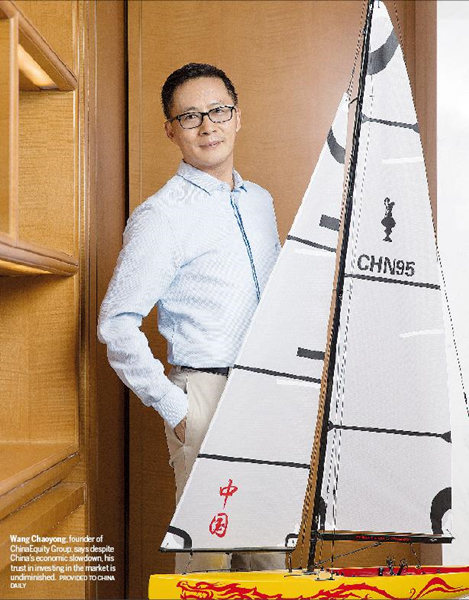For financier, China was clear winner

Wang Chaoyong has a rock-solid faith in Chinese investment, the kind of confidence that inspired the saying, "If you look after pennies, the pounds will look after themselves".
When Wang founded the first Chinese private investment firm, China Equity Group, he gave it a Chinese name that translates as "To be profitable you have to trust China". Now, 17 years later, a company valued at about $5.6 billion that employs more than 50 people underlines just how well-placed that confidence was.
Wang, who was born in central China's Hubei province, was among the first group of Chinese students from Tsinghua University to study finance in the United States and with the first group of Chinese graduates to work on Wall Street. His entrepreneurial endeavors were inspired by the likes of Robin Li, founder of the Baidu Inc, China's major internet search engine, who was among the wave of returnees from overseas who founded businesses in China in the late 1990s.
"At that time, many Chinese returned home with advanced technology and good business models but could not find capital," the 51-year-old Wang says. "I thought I should make myself useful and help them with their startups, help them with fundraising and provide the investment services that go with that."
Wang was the chief representative of the multinational financial services company Morgan Stanley in China from 1993 to 1998 and worked for China Development Bank as a senior banker for two years. After seven years working in China he was confident about his knowledge of the market.
However, going it alone to start ChinaEquity and build a new brand rather than relying on foreign investment companies or state-owned capital meant success would be hard-earned.
"At the time, venture capital was not well understood in China," he says, adding that the first few rounds of fundraising were done overseas.
"But the good thing is that after overcoming difficulties early on, we were able to remain independent and to build our own venture capital and private equity brand.
ChinaEquity first focused on helping Chinese returnees to start businesses, providing investment and related value-added services, he says:
"There was this missionary zeal we had of helping overseas returnees link up with capital and realize their entrepreneurial dreams."
The company has now expanded its range to cover entrepreneurs in China, no matter what their provenance. Half of ChinaEquity's capital is invested in domestic entrepreneurs and businesses.
The country's rapid economic growth has given the company great opportunities, and the development of the internet sector during the company's lifetime has been notable, he says.
"We have witnessed, taken part in and promoted the development of the internet industry and other emerging industries. In the late 1990s there were just a few hundred thousand internet users in China, and now there are 700 million. That provides great growth opportunities for our investment projects and companies."
Wang says his strategy is always to invest in emerging industries and entrepreneurs but to be flexible enough to adapt to changes in the market.
"For example, 15 years ago all of our venture capital would have been invested in the technology, media, telecommunications and the internet sector," he says. "Ten years ago 70 percent was in the internet sector, and five years ago that was down to 50 percent. Now it's 30 percent, the rest going into the healthcare industry and culture industry, which includes sports and education."
Wang says that despite China's economic slowdown, his trust in investing in the market is undiminished, and he continues to see great potential.
His company now only invests in nine areas, he says: high-technology, advanced manufacturing, high-quality service and consumption, the cultural industry, the healthcare industry, the environmental industry, new energy, new materials and new business models.
China's restructuring and transformation in traditional industries will present more possibilities for investors, he says:
"In the emerging industries in which we invested, the companies' growth has been double or triple that of China's GDP. The economic slowdown is not a problem, but it is a test of our insights and our ability to spot the opportunities in the traditional sectors."
Wang says that in the past 17 years ChinaEquity has invested in more than 100 companies, the most successful being Baidu Inc. Now it's getting the best returns in sectors such as healthcare.
"We care more about the returns from each project we have invested in, so we invest in companies that are the unsung heroes in niche markets," he says, adding that there are more than 10,000 venture capital organizations in China, and the environment for starting companies is good.
"Good high-tech companies and internet companies, even when they are still at the R&D stage, can find investors."
At present about 80 percent of ChinaEquity's investment is in China. In Silicon Valley, California, it has funds invested in advanced projects and technology, such as artificial intelligence, self-driving cars and bioengineering technologies. It would like to bring them to Chinese market.
It has also been involved with funds in Europe that invest in the likes of the creative industry and life sciences.
"We also help domestic companies that are going global with merger and acquisition services. And I believe more venture capital and private equity brands will have influence in global markets because more Chinese capital is going global and making acquisitions," Wang says.
He says a good investor needs experience and the ability to learn rapidly. He is keen on literature, including books about history and philosophy that he says can broaden people's horizons and stimulate them mentally. He is also passionate about sports and was the co-founder of the China Silk Road Rally. He prefers to always look forward, putting setbacks and difficulties behind him.
"When you have setbacks you cannot give up, and you need to encourage companies not to. When you invest you need very rational analysis and to be positive and decisive. It is like a combination of science and art: You cannot be overly optimistic, but you must not be afraid to take risks. You need to find a balance."









